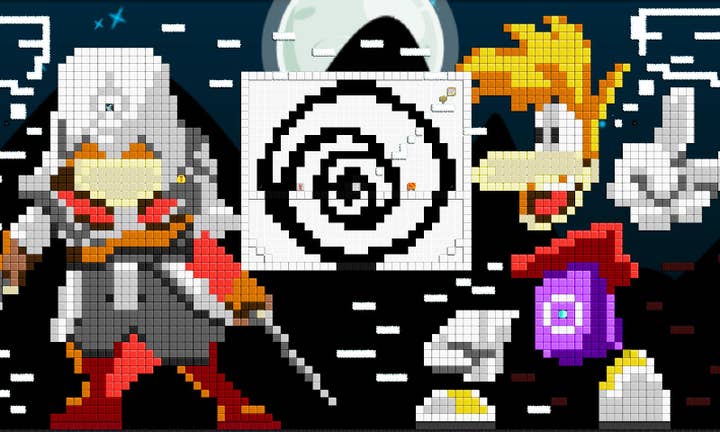Growing into Growtopia
Ubisoft Abu Dhabi head Yannick Theler talks about building a new studio in a non-traditional development scene
The last few years have seen Ubisoft set up new studios in a number of markets with no pre-existing AAA development scene. And while it may be a little early to come up with takeaways from Ubisoft Philippines (established in 2016), Ubisoft Saguenay (2017) or Ubisoft Winnipeg (2018), there's a bit more of a track record for Ubisoft Abu Dhabi, founded in 2011.
Ubisoft Abu Dhabi has been led since its inception by managing director Yannick Theler. Speaking with GamesIndustry.biz this week, Theler explains the original vision for the studio.
"Yves [Guillemot, Ubisoft CEO] was telling us we should be look at the Middle East region because nobody was there at the time as a big player," Theler recalls. "And looking at the population living there, half of the people were under 25 years old. He was saying we should look there because for video game jobs, we may find good candidates because of that young population."
(As with many of the company's studios, Ubisoft Abu Dhabi is also benefitting from a government partnership and favorable tax rates compared to many traditional development hubs.)
Being the only AAA game in a very young town might work to Ubisoft Abu Dhabi's advantage, but Yannick notes it comes with its own set of challenges.
"On top of creating the studio, you needed to create an industry and create a curriculum with schools as well to make sure we have junior people able to join the studio in the future," he says.
That's a tall order to start with, and it wasn't made any easier by Theler's lofty aspirations for the studio.
"When Ubisoft asked me what we'd like to do, I had that in my mind: online, free-to-play MMO games," he says. "That was the original vision of the studio."
That said, Theler admits it was a goal the studio had to build towards. Ubisoft left it to the studio to propose its first projects, and the Abu Dhabi team started simple, creating a pair of mobile hidden object games based on popular TV series, CSI: Hidden Crimes and NCIS: Hidden Crimes.
"The idea of a hidden object game was from our side based on the fact that we didn't have experience on mobile, this project would require ten to 15 people, and we'd be able to develop a framework that was easy for new developers," Theler says. "That was really our risk management [strategy] to make sure we could develop a game with potential."

Those projects helped the team "level up," Theler says, both as individual developers and as a team. So when Ubisoft acquired the independent mobile and PC MMO sandbox game Growtopia in early 2017, Theler says the Abu Dhabi studio was ready to take the next step, and lobbied the parent company to take stewardship of the title.
"For us, in our minds, we really wanted to take that project. Having a successful project, an MMO sandbox open-world game, and looking at how the market is shifting into that area, we really wanted to have this one. So we pitched Ubisoft on our expertise, our experience, and our vision."
"When Ubisoft asked me what we'd like to do, I had that in my mind: online, free-to-play MMO games. That was the original vision"
Ubisoft was persuaded, even though the game was clearly a level of complexity beyond what the Abu Dhabi team had worked on previously. It would require them to manage a massive community, provide customer support for an ongoing game-as-a-service, and develop a game featuring cross-platform play. Theler said going for Growtopia was a strategic decision because the studio lacked all of that experience, but he believes it will all be crucial given where the industry appears headed in the future.
Taking over a regularly updated service game mid-stream is a tall task, and Ubisoft Abu Dhabi worked closely with Growtopia's original developers, Seth Robinson and Mike Hommel, on a hand-over strategy. The pair introduced Ubisoft Abu Dhabi to the community and the moderators, and then moved step-by-step into the background over a couple months. Robinson and Hommel explained to Ubisoft how they handled the game's monthly updates, offered advice about what was needed and monitored what the studio was doing for a time before everything was transitioned to the Abu Dhabi team.
When asked about how to hand over a community-focused game without running afoul of that community, Theler stressed the need to learn and be humble. The handover and greater resources Ubisoft could commit to the game also gave them a chance to credibly offer improvements to the community. For example, Robinson and Hommel impressed upon Ubisoft Abu Dhabi how improvements could be made with the developer simply "being present" in the game more.
"Seth and Mike were two guys with a couple of moderators," Theler explains. "So the idea for us was to invest in customer support and moderators to make sure we can be there 24/7 and answer customers all around the world."
That's important, as one of the game's mechanics is a "broadcast" feature in which players can pay in-game currency (which can be bought with real-world money) to blast a player-entered message to 1,000 people, or pay for a "super broadcast" that goes to everyone online playing the game at the time. While it allows for some social interactions, negative reviews of the game on online storefronts have indicated broadcast hate speech and scam links are sore points for players.
"We invested in moderation and customer support and communication to the players to make sure we can have a non-toxic place"
"We invested in moderation and customer support and communication to the players to make sure we can have a non-toxic place," Theler says. "Because scamming was there, and we just realized we had to take time to educate the players, or to inform the players that they can contact us, to develop different tools in-game as well, and having more people in the game to make sure these things aren't happening. "
Beyond the team in Abu Dhabi, Ubisoft also set up a North American moderation and community management team to ensure that player concerns can be handled more promptly
"We've optimized the time to answer tickets for players because we invested in customer support and community management," Theler says. "We can make sure that players will get feedback within a day and get their ticket resolved. We added more community managers to make sure when players are in-game they'll see moderators and the moderators are organizing events."
It's only been a couple years, but Ubisoft Abu Dhabi's tenure running Growtopia appears to be a success. Theler says the pace of new downloads for the game has been fairly consistent, as have the daily active users. The game is set to mark its seventh anniversary later this year, and Ubisoft is continuing to invest in it, planning on at least a ten-year life cycle.
Even if Growtopia continues well beyond its first decade, Ubisoft Abu Dhabi is itself looking to grow beyond the project. It has expanded to two teams -- one dedicated to Growtopia and one working on an unannounced new project.
Currently, Ubisoft Abu Dhabi has a staff of nearly 70 people. That's a little bit shy of the 100 headcount goal the studio originally set for its first five years back in 2011, but Theler believes missing that target was a necessary trade-off.
"We need to take time to train and develop the experiences of the people," he says. "If we wanted to grow, we could start new projects and have new teams. But I want us to be very good at what we do."


